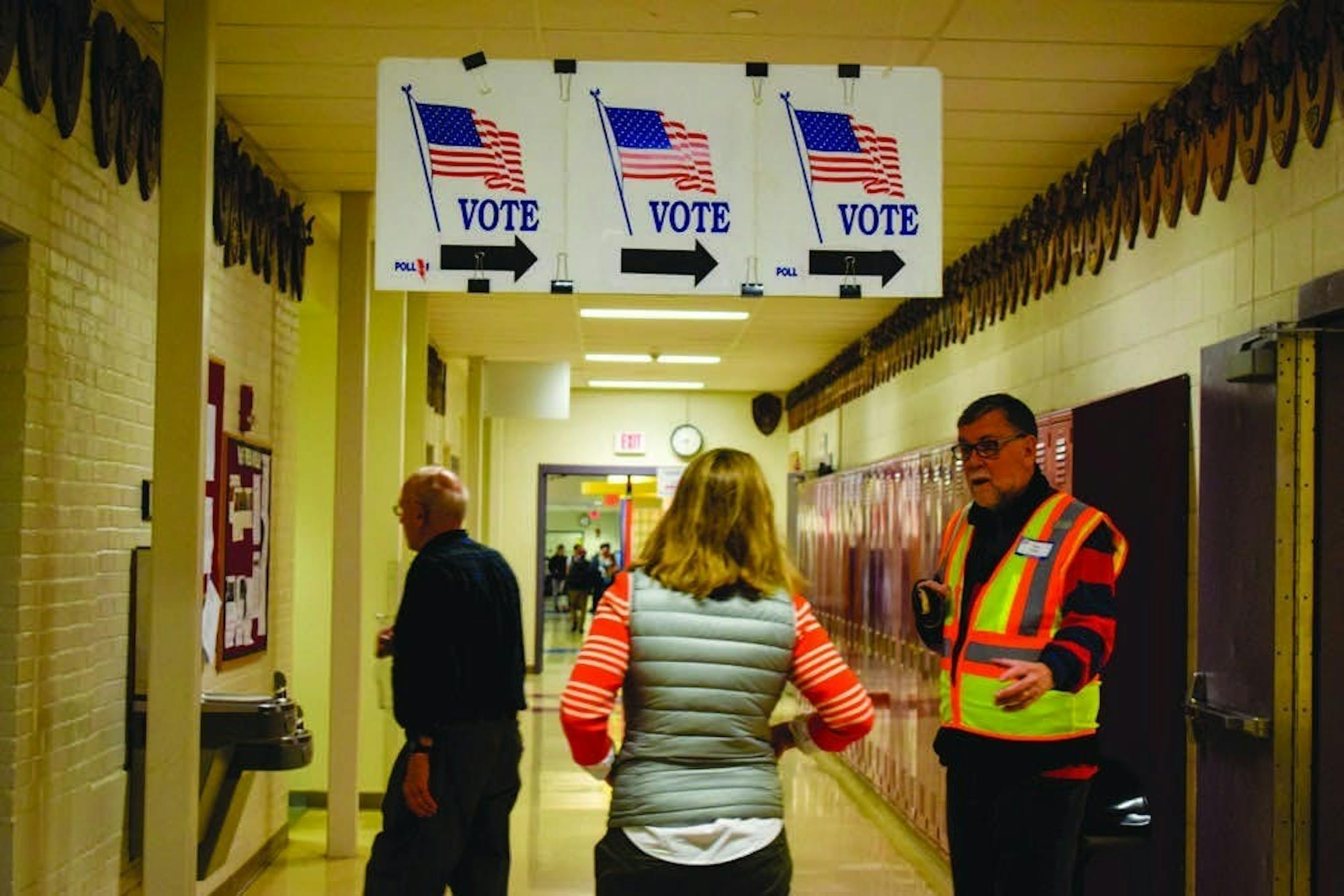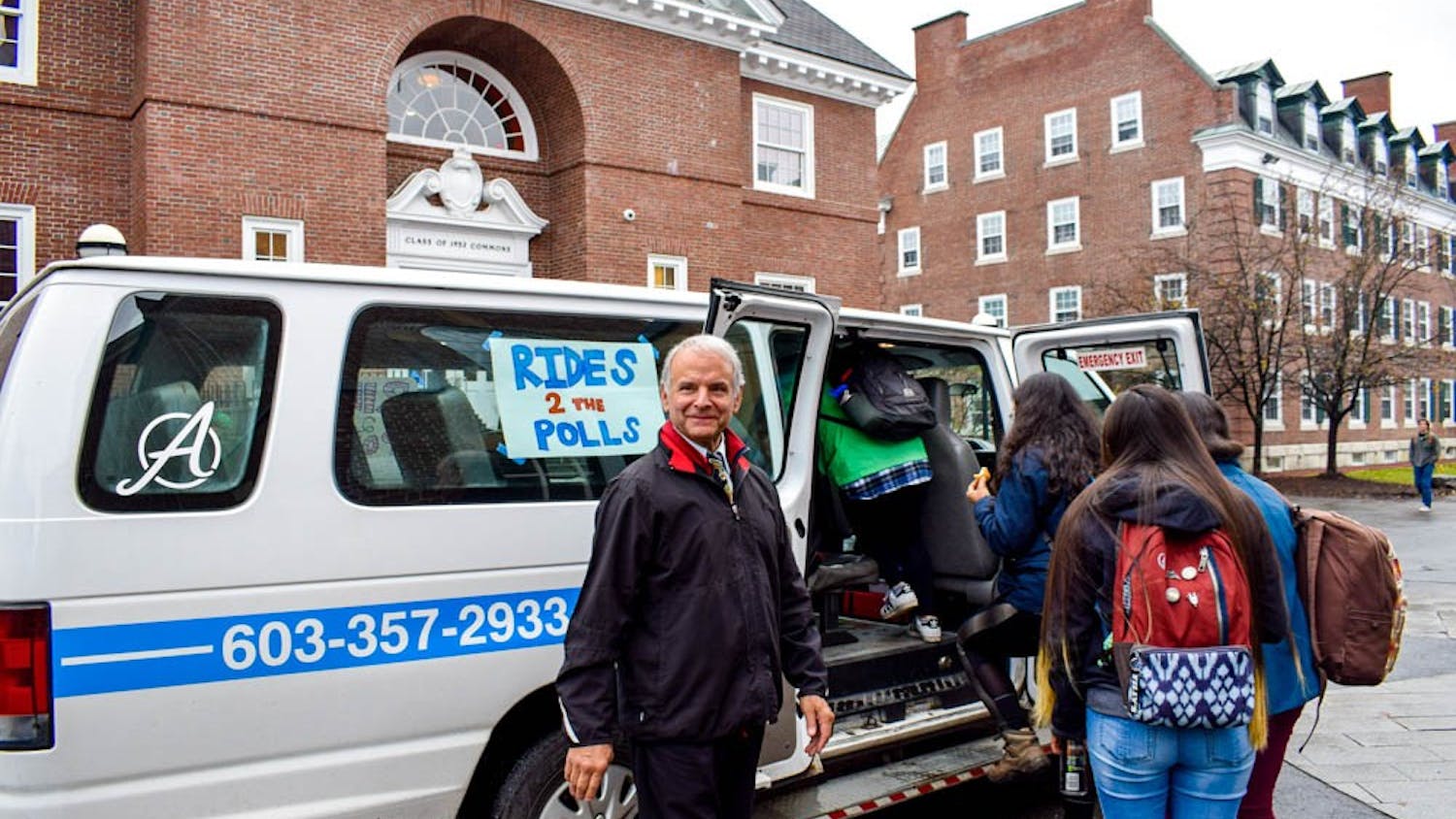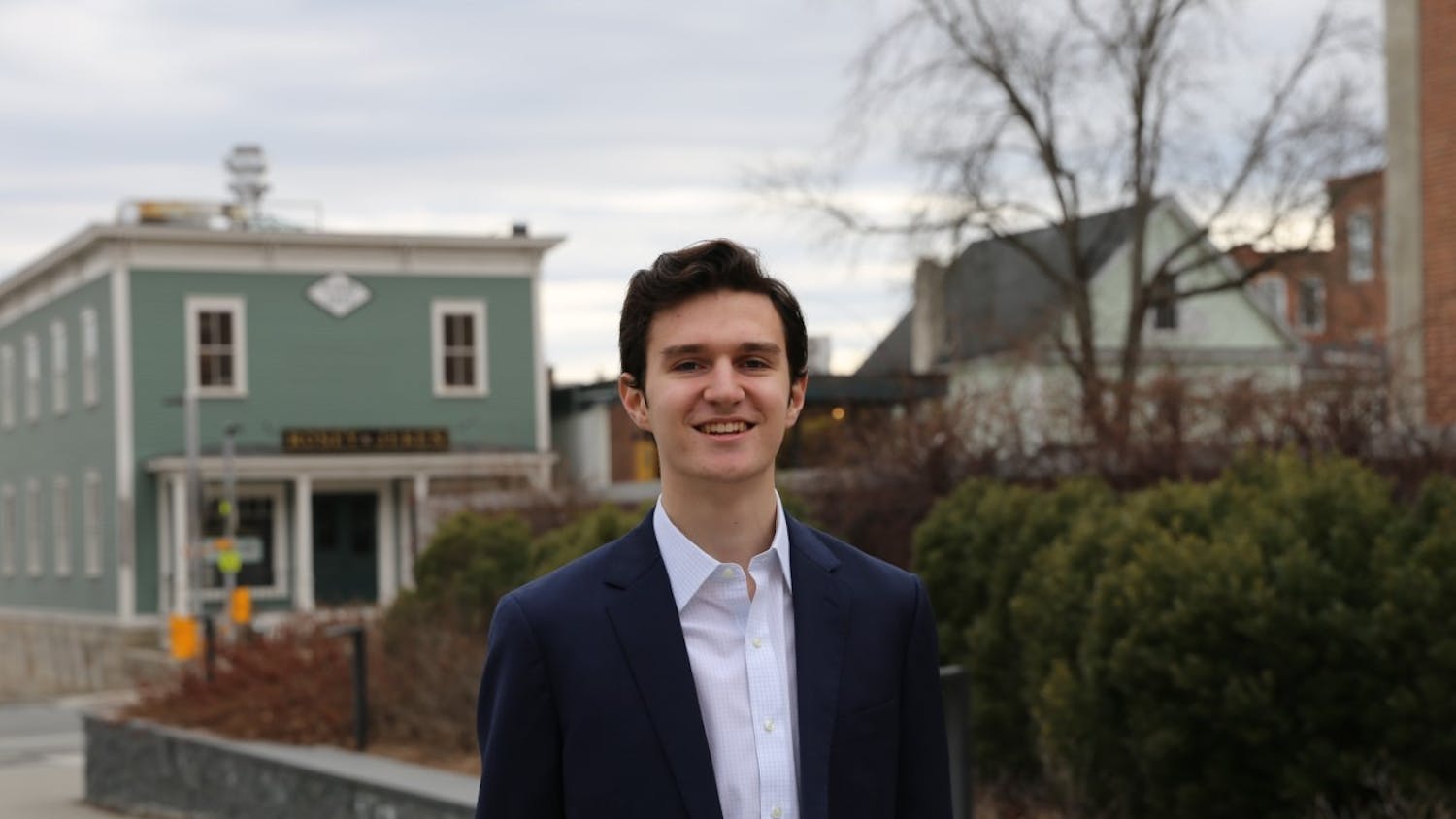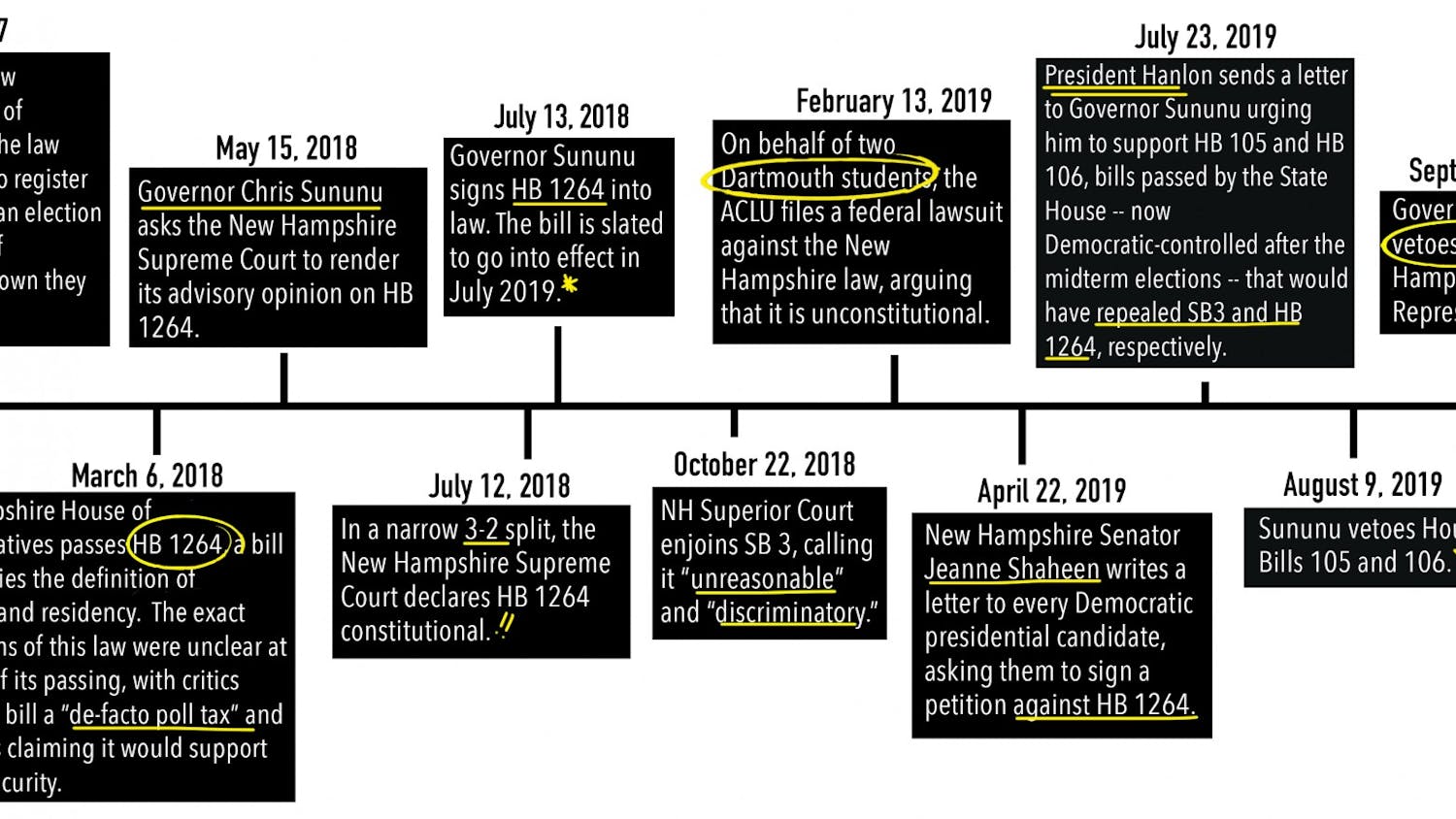American Civil Liberties Union lawyers representing plaintiffs Caroline Casey ’21 and Maggie Flaherty ’21 in a lawsuit challenging state residency law House Bill 1264 withdrew their case on Friday, two days after the New Hampshire Supreme Court ruled that the bill has no effect on voters.
Many critics originally believed that the bill impeded students’ ability to vote in New Hampshire. Last Wednesday, however, the New Hampshire Supreme Court clarified that the bill, which was signed into law in July 2018, only changes residency requirements, and that there is no link between registering to vote and motor vehicle registration. Because the court explained that voters do not need to be residents in New Hampshire to vote — only domiciled in the state — the change in residency definition does not affect voting.
“[E]lection laws do not establish motor vehicle or driving privileges and obligations, nor do the motor vehicle laws establish voting eligibility,” the New Hampshire Supreme Court wrote in the decision.
Michael Parsons ’20, president of the New Hampshire Young Democrats, said that he was initially concerned when he learned of the lawsuit’s withdrawal but quickly realized that the withdrawal did not indicate a loss for the plaintiffs.
“When I first saw the headlines that some newspapers were running with, I was really worried — I thought that that was the ball game, that we had lost,” he said. “Once we actually looked into it, we found that the ruling didn’t change a whole lot.”
Henry Klementowicz, staff attorney at the ACLU of New Hampshire and one of Casey and Flaherty’s lawyers, said that the “technical” state Supreme Court decision “does not change the fact that if you live in New Hampshire, you can vote in New Hampshire.” He noted that voters do not need a New Hampshire driver’s license to register to vote.
“We have said since the beginning that driver’s licensing and voting should not be linked, and after this [state Supreme Court] decision, we have come to the decision that it is no longer necessary to pursue this case any further,” he wrote.
The ACLU filed the lawsuit on behalf of Casey and Flaherty in February 2019 after the passage of HB 1264, which modified the definition of “resident or inhabitant” and “residence or residency” under New Hampshire state law. Opponents of the bill expressed concern that the law would infringe upon students’ right to vote in New Hampshire. Flaherty said that by potentially requiring students to obtain a New Hampshire driver’s license in order to vote, the law was essentially imposing a “retroactive poll tax.” She also said that the bill eventually “became a burden on voting rights” because it was “so confusing and convoluted.”
Casey said that the lawsuit showed that students who go to school in New Hampshire are committed to the state and its politics.
“It’s hard to describe how important the local community is to me and to a lot of Dartmouth students,” she said. “[Students are] really involved with the town and affected by local laws.” She added that students have “every right to be voting members” of the Hanover community.
President of the Dartmouth College Democrats Jennifer West ’20 agreed that student voting representation is “vitally important.”
“When we send elected officials to the State House or to the Governor's office, those are the individuals that are going to decide [issues such as] whether or not Dartmouth students have access to reproductive health care or student housing or job benefits,” she said, adding that these issues impact students “on a day-to-day basis.”
Now that the implications of HB 1264 have been clarified, student Democratic leaders like Parsons and West said that there may be a spike in student voter registration in Hanover.
However, Hanover town clerk Betsy McClain said that the town could face a “dilemma” in registering voters in time for the November election.
McClain explained that New Hampshire’s voter registration process is designed to be done in-person, unlike in many other states. She described the absentee registration process as “onerous” and “cumbersome,” as registrants must have access to a printer or a copier and are required to sign certain affidavits with witnesses. McClain added that the in-person registration would likely be less efficient and more challenging to set up due to social distancing requirements.
Additionally, McClain said that the New Hampshire Supreme Court has not yet clarified whether members of the Class of 2024 will be eligible to register to vote in New Hampshire should they not live in Hanover during the fall term.
Despite these difficulties, Flaherty said that any student who is an American citizen and domiciled in New Hampshire — for example, who has a room number on campus — can now register to vote from home.
“Do not let a complicated absentee registration process deter you, especially given that town clerks like Betsy McClain are so incredibly helpful and such a great resource to reach out to,” she said.
Many of the Republicans who supported HB 1264 are also considering the end of the lawsuit a win. Stephen Stepanek, chairman of the New Hampshire Republican Party, issued a statement on Friday saying the lawsuit “wasted everyone’s time and state resources.”
The statement also accused New Hampshire Democrats of “vilifying” Republicans with “false calls of voter suppression” and said that Democrats were “admitting today that their faux outrage was all a ruse when they realized they had no fighting chance in court.”
State Rep. Kathleen Hoelzel (R-Raymond), one of the sponsors of HB 1264, said that she was “pleased” that the lawsuit was withdrawn “so that we can get on to business.” She said that her interpretation of the law has always been that out-of-state college students are able to register to vote in New Hampshire, and that “it was quite evident that there wasn’t anything to the lawsuit to begin with.”
Parsons said he believes that Republicans, including New Hampshire Gov. Chris Sununu (R), are using the end of the lawsuit for political gains, even though the court’s ruling favors a Democratic interpretation of the law.
“[Sununu] can go parade around the fact that HB 1264 will be law, but the simple fact is, we’re going to continue to organize and make sure that student voters have the information they need so they’re not affected by the misinformation that constantly surrounds HB 1264.”
Riley Gordon ’22, who is running for a seat in the New Hampshire State House, said that while the result of the lawsuit is “certainly good,” he is concerned that Republicans will attempt to pass another bill to limit students’ ability to vote in the state.
“I'm happy with the way that this turned out, but we have to be vigilant. We have to be ready for the next one,” Gordon said.
Casey added that the lawsuit emphasizes “the importance of electing people who don't support restrictive voter laws and understand what students add to our local communities.” She encouraged students to stand up for voting rights down the line.
“If we elect people that support voting rights, then hopefully this won't happen in the future,” Casey said. “If we have any reason in the future to believe that we're encountering voter suppression or that the right to vote is threatened, then I would definitely encourage students to fight back against that as it comes.”

Lauren ('23) is news executive editor for The Dartmouth. She is from Bethesda, Maryland, and plans to major in government and minor in public policy.




